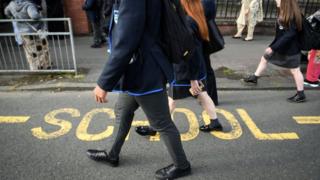 Image copyright
Getty Images
Image copyright
Getty Images
More than 100,000 pupils in Scotland are absent from school with attendance down to 84.5%, according to Scottish government figures.
Data collected from local authorities shows that more than 15.5% pupils were off school last Friday.
However, only 22,821 of the absences are recorded as "Covid-19 related".
The Scottish government said it was common for other viral infections to circulate after a "prolonged break" away from school.
Scotland's largest teaching union, the EIS, told BBC Scotland it believed many parents were "erring on the side of caution" and keeping children who had cold symptoms off school.
Pupils in Scotland began returning to school on 11 August after being away since March.
Provisional figures from 28 August show that 84.5% of pupils in Scottish schools were present, down from a confirmed 95.8% attendance on 17 August.
Covid-related absences in Scottish schools
Attendance remained above 90% until 21 August, before dropping to 89.2% on 24 August following the weekend.
During the last decade, attendance levels over the whole school year have been between 93% and 94%.
About 3% of pupils were absent last Friday for a Covid-related reason, with 12.3% absent for non-Covid reasons, including pupil exclusions.
A Covid-related absence includes a "positive test, showing symptoms, self-isolation, quarantining, and parents not sending their child to school against public health guidance".
The Scottish government reported on Tuesday that almost 40,000 pupils had been tested for coronavirus since term started, with 117 positive results.
Absentee rates are higher than usual - but not dramatically higher.
In the week before schools closed in March, there were reports that between a third and a half of pupils at some schools were off.
The numbers provide reassurance most children are going to school but may also suggest that some parents are being cautious about sending them if they are slightly unwell - for instance suffering from a cold.
Earlier this week the Scottish government's national clinical director Dr Jason Leitch wrote an open letter to parents.
In the letter he offered advice on what parents should do if children are suffering from bugs and colds.
He said that in many cases children would be well enough to attend.
But he also stressed that those with potential Covid 19 symptoms should self-isolate and get tested.
Speaking on Monday, Education Secretary John Swinney said it was common for "colds and similar viral infections to circulate" when pupils returned from a prolonged break.
"In many cases children will be well enough to attend school and continue their learning with little or no interruption to their education," he said.
"In other cases, for instance where they have quite a heavy cold with a runny nose, they may need to take a day or two off to recover."
He said any pupil with Covid-19 symptoms were required to self-isolate and seek a test.
But he added: "In order to ensure that your child does not miss out on their education it is important to be clear on how Covid-19 symptoms differ from those of other infections that we normally see circulating at this time of year."
Attendance in Scottish schools
National clinical director Jason Leitch has also written to schools with guidance on what to do about pupils who develop non-Covid symptoms.
Larry Flanagan, general secretary of the EIS, said the union had received reports of "higher than normal illness absences" in schools across Scotland, with indications that cold viruses were circulating among pupils.
He said significant numbers of pupils and staff were being affected in some areas.
"This may be the result of pupils and staff being isolated from others for a prolonged period, with the result that the virus is spreading more quickly now than schools have re-opened," he added.
"It is also likely to be the case that many parents will be erring on the side of caution in keeping their children off with cold symptoms at the present time."

 5 years ago
723
5 years ago
723 

